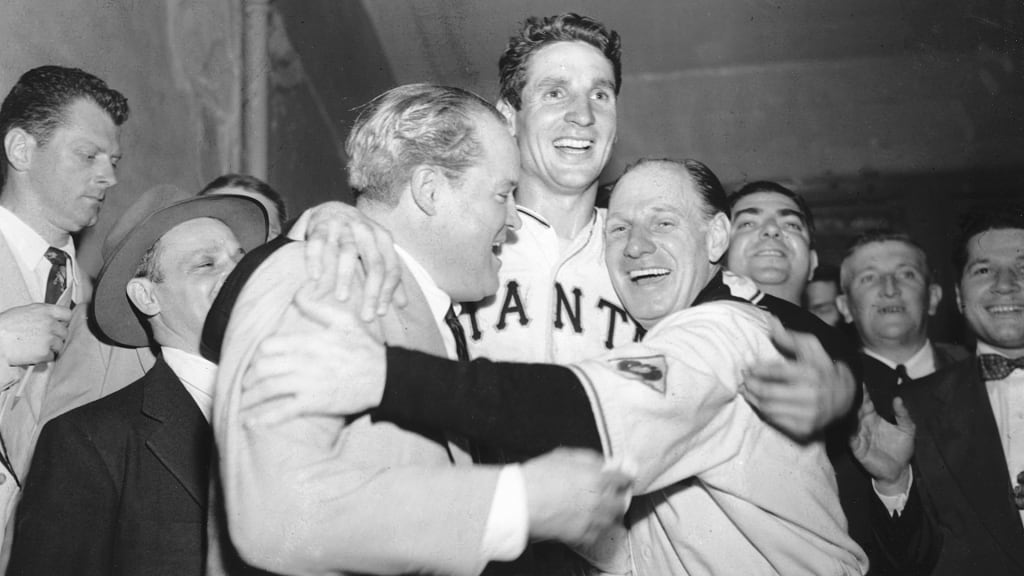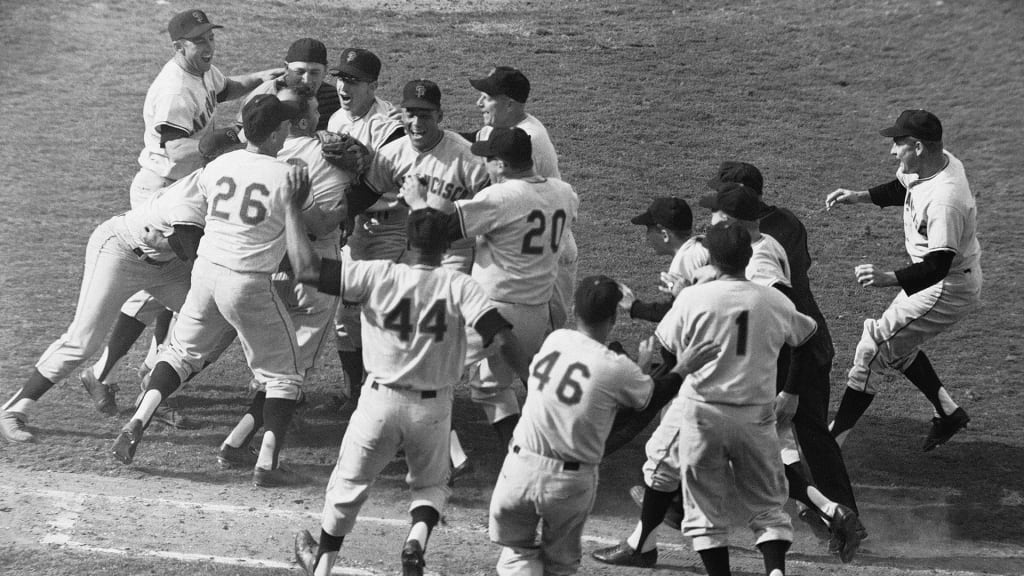
The 2022 postseason begins on Friday and does so with a new, expanded format. There are now 12 playoff teams instead of 10 and three Wild Card teams in each league instead of two. While the top two seeds in each league will enjoy a bye to reach the Division Series, the other eight clubs will meet in a new round.
The Wild Card Series is unusual, in that it has a best-of-three format (with all three games at the ballpark of the higher seed). MLB has played many best-of-five and best-of-seven series, and for nine seasons (2012-19, '21) also had the win-or-go home Wild Card Game.
But for nearly six decades, the best-of-three format was a relic. It took the strange circumstances of the pandemic-shortened 2020 season to bring it back, with all 16 playoff teams that year battling it out in best-of-three Wild Card Series.
Before that, you had to go all the way back to 1962, in the times of the Beatles, the Kennedys and John Glenn orbiting the Earth, to find the last occurrence. MLB had used the best-of-three format four times to break a tie in league pennant races. Two of them went the distance, and one of them yielded one of the signature moments in the sport’s history.
Here’s a quick look back at each example prior to 2022, in reverse chronological order.
Sept. 29-Oct. 2, 2020: 16 teams play in Wild Card Series
AL results: A's over White Sox (2-1), Astros over Twins (2-0), Yankees over Indians (2-0), Rays over Blue Jays (2-0)
NL results: Braves over Reds (2-0), Marlins over Cubs (2-0), Padres over Cardinals (2-1), Dodgers over Brewers (2-0)
Six of the eight series resulted in two-game sweeps, including the Marlins shocking the Cubs in their first postseason appearance since winning the 2003 World Series. But there was some drama as well.
Both the A's and Padres lost Game 1 of their series before storming back to advance. Facing elimination in Game 2, San Diego trailed St. Louis 6-2 in the sixth inning but got back-to-back homers from Fernando Tatis Jr. (a three-run shot) and Manny Machado to tie things up, then got seventh-inning big flies from Wil Myers and Tatis (two-run shot) to take the lead before holding on for a wild victory. Nine Padres relievers then shut out the Cardinals in a decisive Game 3 to lift the franchise to its first postseason series win since 1998.
Oct. 1-3, 1962: Giants def. Dodgers (2-1) to win National League pennant
Game 1 Winner (score): Giants (8-0)
Game 2 Winner (score): Dodgers (8-7)
Game 3 Winner (score): Giants (6-4)
October 1962 is remembered for Willie McCovey’s screaming line drive that would have won Game 7 of the World Series had Yankees second baseman Bobby Richardson not been standing there to snag it. But San Francisco had to stretch the regular season to the limit before it stretched the Fall Classic to the final play.
Two longtime NL rivals in New York City renewed their rivalry on California soil, as the Giants erased a four-game deficit over the season’s final two weeks to catch up to Sandy Koufax, Maury Wills (fresh off a then-record 104-steal season) and the star-studded Dodgers. Lefty Billy Pierce, who saw the Dodgers defeat his White Sox in the 1959 World Series, got revenge by outdueling Koufax and twirling a shutout in a dominant Giants win in Game 1. Los Angeles’s offense continued to lay goose eggs in Game 2, running a scoreless-inning streak up to 35 dating back to the regular season, before releasing its frustration with a seven-run outburst in the sixth. The Giants didn’t go away easily, tying the game in the eighth and forcing their rivals to come up with one more rally. L.A. responded, scoring a walk-off win on Ron Fairly’s one-out sacrifice fly that brought home Wills in the ninth. Game 2 stretched four hours and 18 minutes, which at the time was the second-longest nine-inning game on record.
Game 3 offered a classic starting matchup between Juan Marichal and Johnny Podres, but the winner-take-all contest came down to late-game heroics. The Dodgers carried a 4-2 lead into the ninth, but Willie Mays’ bases-loaded single kick-started a four-run rally for the Giants. Pierce played hero again by closing out a perfect bottom of the ninth, and San Francisco sent the fans at the brand-new Dodger Stadium home with their heads in their hands.

Sept. 28-29, 1959: Dodgers def. Braves (2-0) to win NL pennant
Game 1 Winner (score): Dodgers (3-2)
Game 2 Winner (score): Dodgers (6-5)
The Dodgers, incredibly, played in all four of these best-of-three series, but this was their only triumph. Playing just their second season in Los Angeles, the Dodgers pushed Hank Aaron, Eddie Mathews and the reigning league champion to a tiebreaker -- and it could have been a three-way tie, as the Giants finished just three games back and were in contention up to the final day of the regular season.
Game 1 of the series didn’t feature any of the starting pitchers one might have expected; Milwaukee’s Warren Spahn and Lew Burdette and Los Angeles’ Don Drysdale and Podres were all unavailable (and Koufax wasn’t yet Koufax), leaving the Braves’ Carl Willey to battle the Dodgers’ Danny McDevitt. The latter lasted just four outs into the game, but reliever Larry Sherry came in and, after allowing an inherited runner to score, twirled seven shutout innings to keep the mighty Braves at bay. Catcher John Roseboro’s sixth-inning homer proved to be the difference, sending the Dodgers back to the L.A. Memorial Coliseum for Game 2 and a potential Game 3 with a 1-0 series lead.
The Dodgers wouldn’t need a Game 3, but they would need a dozen thrilling innings to dispatch the Braves. L.A. trailed, 5-2, after a scoreless top of the ninth by Koufax, but rallied for three runs off Burdette -- the man who had won three World Series games just two years prior -- and Spahn. The game stayed deadlocked until the bottom of the 12th, when Braves shortstop Felix Mantilla made a throwing error that let Gil Hodges come home with the pennant-winning run. The Dodgers went on to beat the “Go Go” White Sox in the World Series.
Oct. 1-3, 1951: Giants def. Dodgers (2-1) to win NL pennant
Game 1 Winner (score): Giants (3-1)
Game 2 Winner (score): Dodgers (10-0)
Game 3 Winner (score): Giants (5-4)
Anyone remember what happened in this series?
For those not in the know, the Dodgers held a 13-game lead on the Giants as late as Aug. 11 before the Manhattanites went on one of the all-time hot runs -- 37-8 the rest of the way -- to force the three-game tiebreaker. In fact, Brooklyn had to win on the last day of the season just to keep the Giants from walking away with the pennant outright.
The Giants claimed Game 1 on homers by Bobby Thomson and Monte Irvin, but they saw the Dodgers club four home runs and unload their frustrations in a 10-0 rout in Game 2. That set up one of baseball’s most famous contests in the winner-take-all Game 3. The Dodgers were three outs away from rectifying their midseason collapse and claiming the pennant as they carried a 4-1 lead into the bottom of the ninth with ace Don Newcombe on the mound. But Alvin Dark led off with a single and Don Mueller followed with another knock past first baseman Gil Hodges -- who was fatefully holding the runner and exposing a hole on the right side. Whitey Lockman soon followed with an RBI double, chasing Newcombe from the game.
Dodgers manager Chuck Dressen brought in Game 1 starter Ralph Branca after just one day of rest, and Branca threw just two pitches before Thomson clubbed his pennant-winning homer into the left-field seats at the Polo Grounds -- AKA his “Shot Heard ‘Round the World.” Thomson forever became a postseason legend, while Branca was left in tears on the steps of the visitors’ clubhouse. The Giants went on to lose to their Subway Series-rival Yankees in six games in the World Series.
Oct 1. and 3, 1946: Cardinals def. Dodgers (2-0) to win NL pennant
Game 1 Winner (score): Cardinals (4-2)
Game 2 Winner (score): Cardinals (8-4)
The Dodgers, in a running theme here, couldn’t hold on to a commanding lead down the stretch, this time seeing a seven-game cushion on Independence Day melt away in August and September.
St. Louis was Brooklyn’s Achilles' heel that year, winning 14 of the first 22 regular-season head-to-head matchups and the Redbirds had “the Bums’” number again in MLB’s first tiebreaker series. Southpaw Howie Pollet carried the Cardinals in Game 1, permitting just two Dodger runs in a complete-game effort. The series shifted to Ebbets Field for Game 2, but the Cardinals silenced the Brooklyn crowd, putting up eight runs in the first televised postseason ballgame to take the pennant.
St. Louis would have a tougher time putting away Ted Williams and the Red Sox, stretching the World Series all the way to Game 7 before Enos Slaughter went on his “mad dash” home to claim the title.
